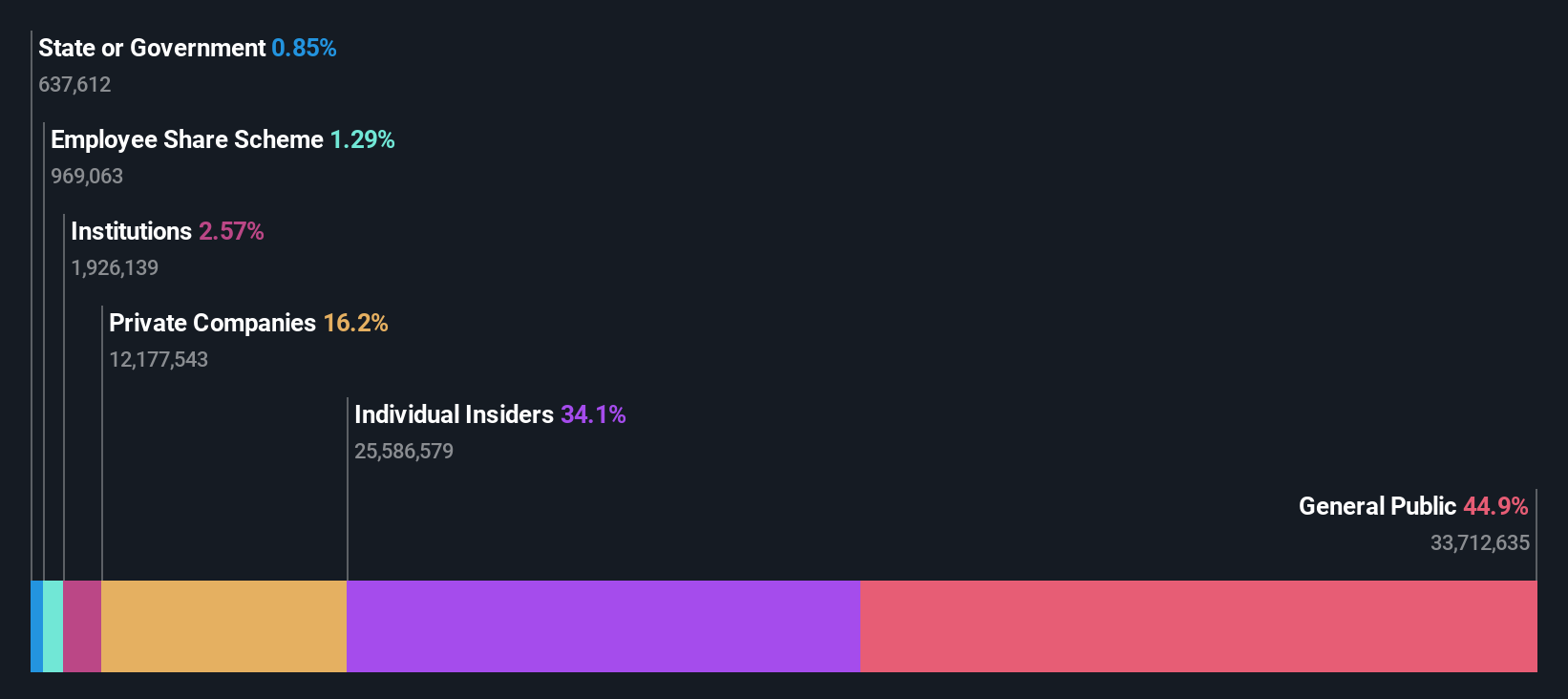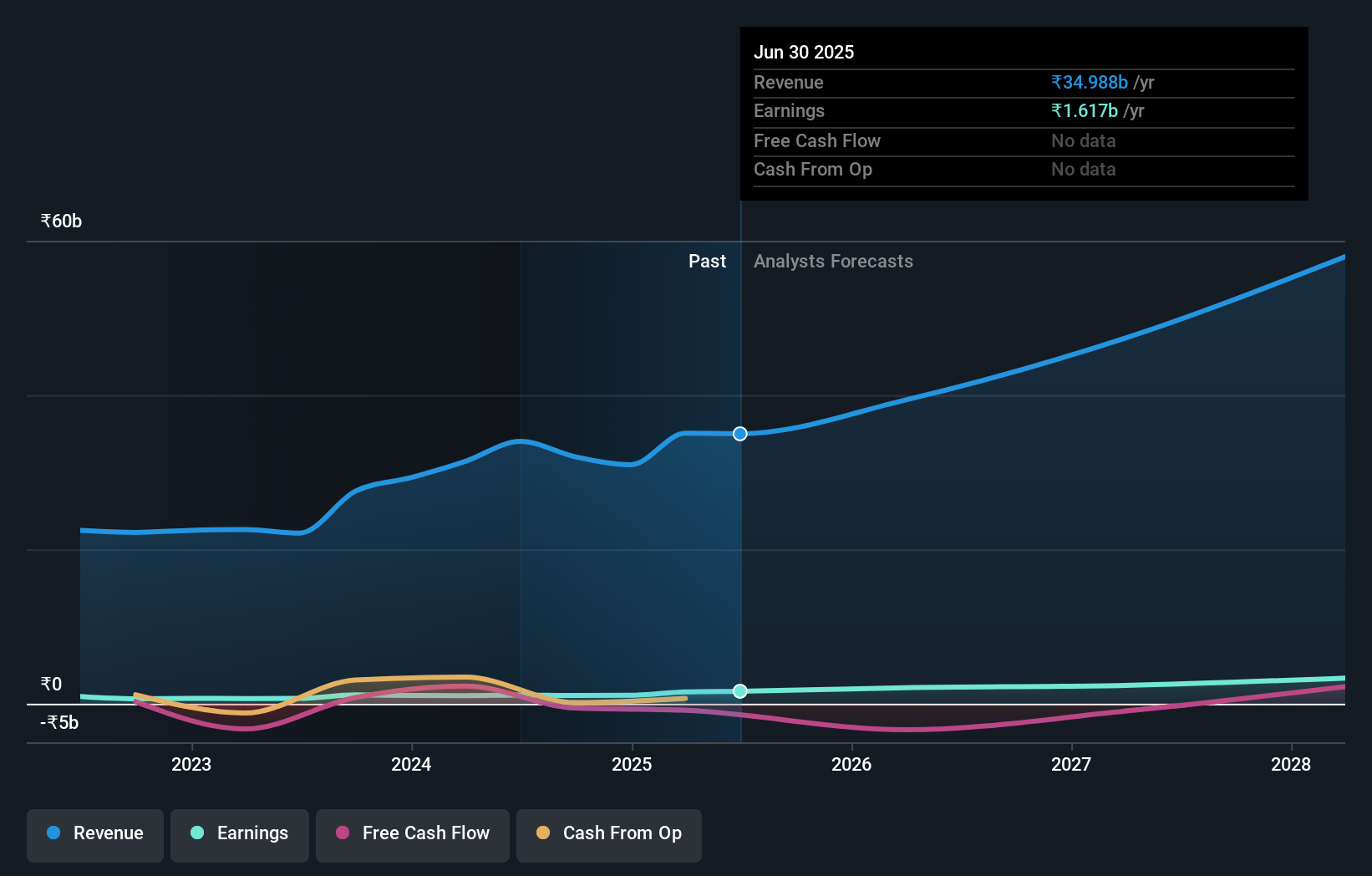- India
- /
- Construction
- /
- NSEI:MANINDS
Retail investors invested in Man Industries (India) Limited (NSE:MANINDS) up 11% last week, insiders too were rewarded
Key Insights
- Man Industries (India)'s significant retail investors ownership suggests that the key decisions are influenced by shareholders from the larger public
- The top 10 shareholders own 50% of the company
- Insider ownership in Man Industries (India) is 34%
Every investor in Man Industries (India) Limited (NSE:MANINDS) should be aware of the most powerful shareholder groups. And the group that holds the biggest piece of the pie are retail investors with 45% ownership. In other words, the group stands to gain the most (or lose the most) from their investment into the company.
While retail investors were the group that reaped the most benefits after last week’s 11% price gain, insiders also received a 34% cut.
Let's take a closer look to see what the different types of shareholders can tell us about Man Industries (India).
Check out our latest analysis for Man Industries (India)

What Does The Institutional Ownership Tell Us About Man Industries (India)?
Institutions typically measure themselves against a benchmark when reporting to their own investors, so they often become more enthusiastic about a stock once it's included in a major index. We would expect most companies to have some institutions on the register, especially if they are growing.
Less than 5% of Man Industries (India) is held by institutional investors. This suggests that some funds have the company in their sights, but many have not yet bought shares in it. If the business gets stronger from here, we could see a situation where more institutions are keen to buy. It is not uncommon to see a big share price rise if multiple institutional investors are trying to buy into a stock at the same time. So check out the historic earnings trajectory, below, but keep in mind it's the future that counts most.

Man Industries (India) is not owned by hedge funds. Our data suggests that Ramesh Mansukhani, who is also the company's Top Key Executive, holds the most number of shares at 15%. When an insider holds a sizeable amount of a company's stock, investors consider it as a positive sign because it suggests that insiders are willing to have their wealth tied up in the future of the company. Meanwhile, the second and third largest shareholders, hold 12% and 6.5%, of the shares outstanding, respectively. In addition, we found that Nikhil Mansukhani, the CEO has 4.8% of the shares allocated to their name.
We also observed that the top 10 shareholders account for more than half of the share register, with a few smaller shareholders to balance the interests of the larger ones to a certain extent.
While studying institutional ownership for a company can add value to your research, it is also a good practice to research analyst recommendations to get a deeper understand of a stock's expected performance. There is a little analyst coverage of the stock, but not much. So there is room for it to gain more coverage.
Insider Ownership Of Man Industries (India)
While the precise definition of an insider can be subjective, almost everyone considers board members to be insiders. Company management run the business, but the CEO will answer to the board, even if he or she is a member of it.
Insider ownership is positive when it signals leadership are thinking like the true owners of the company. However, high insider ownership can also give immense power to a small group within the company. This can be negative in some circumstances.
Our most recent data indicates that insiders own a reasonable proportion of Man Industries (India) Limited. Insiders own ₹11b worth of shares in the ₹32b company. It is great to see insiders so invested in the business. It might be worth checking if those insiders have been buying recently.
General Public Ownership
With a 45% ownership, the general public, mostly comprising of individual investors, have some degree of sway over Man Industries (India). While this size of ownership may not be enough to sway a policy decision in their favour, they can still make a collective impact on company policies.
Private Company Ownership
Our data indicates that Private Companies hold 16%, of the company's shares. Private companies may be related parties. Sometimes insiders have an interest in a public company through a holding in a private company, rather than in their own capacity as an individual. While it's hard to draw any broad stroke conclusions, it is worth noting as an area for further research.
Next Steps:
It's always worth thinking about the different groups who own shares in a company. But to understand Man Industries (India) better, we need to consider many other factors. To that end, you should be aware of the 2 warning signs we've spotted with Man Industries (India) .
If you would prefer discover what analysts are predicting in terms of future growth, do not miss this free report on analyst forecasts.
NB: Figures in this article are calculated using data from the last twelve months, which refer to the 12-month period ending on the last date of the month the financial statement is dated. This may not be consistent with full year annual report figures.
New: Manage All Your Stock Portfolios in One Place
We've created the ultimate portfolio companion for stock investors, and it's free.
• Connect an unlimited number of Portfolios and see your total in one currency
• Be alerted to new Warning Signs or Risks via email or mobile
• Track the Fair Value of your stocks
Have feedback on this article? Concerned about the content? Get in touch with us directly. Alternatively, email editorial-team (at) simplywallst.com.
This article by Simply Wall St is general in nature. We provide commentary based on historical data and analyst forecasts only using an unbiased methodology and our articles are not intended to be financial advice. It does not constitute a recommendation to buy or sell any stock, and does not take account of your objectives, or your financial situation. We aim to bring you long-term focused analysis driven by fundamental data. Note that our analysis may not factor in the latest price-sensitive company announcements or qualitative material. Simply Wall St has no position in any stocks mentioned.
About NSEI:MANINDS
Man Industries (India)
Manufactures, processes, sells, and trades in submerged arc-welded pipes and steel products in India.
Solid track record with reasonable growth potential.
Similar Companies
Market Insights
Community Narratives




